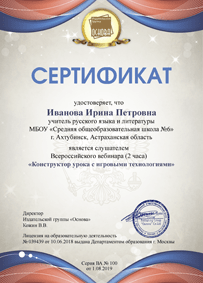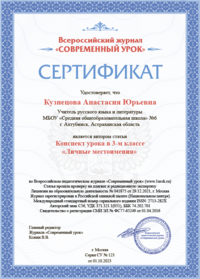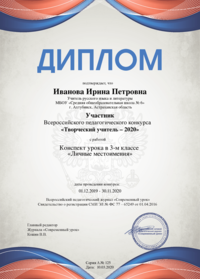Прием «Обучение в паре на одном листе» как эффективный способ обучения языковому материалу на примере английского языка
Автор: Емукова Альбина Анатольевна
Организация: МАОУ «СОШ №2» г. Нурлат Республика Татарстан
Населенный пункт: г. Нурлат
Главная цель воспитателя должна заключаться в развитии самодеятельности, благодаря которой, человек может впоследствии стать распорядителем своей судьбы, продолжателем образования своей жизни.
А. Дистерверг
В последнее время в педагогическом сообществе все чаще возникает тема организации работы обучающихся на уроках в парах и малых группах. Приводится много аспектов их положительного влияния на образовательный процесс, примеров выявления их эффективности при мониторинге результатов обучения. Групповая работа дает возможность каждому учащемуся проявить себя в той или иной мере, каждый член группы вносил свой вклад в общее дело, чувствуя ответственность за конечный результат. Групповая работа развивает умение вырабатывать собственное мнение, находить выход из проблем; способности самостоятельно заниматься своим обучением; умение сотрудничать и работать в группе; способности выстраивать взаимоотношения с другими людьми. [3]
Предлагаю дидактический материал для организации закрепления грамматического материала на основе работы в паре. Этот прием носит оригинальное название “Rally Coach”. Учителя Республики Татарстан имели возможность ознакомиться с ним в ходе реализации совместного проекта «Совершенствование качества преподавания в Республике Татарстан» Министерства образования и науки Республики Татарстан и сингапурской компании “Educare”.
Его суть состоит в следующем: каждая пара обучающихся получает один лист для работы. Задание представляет собой набор предложений, где нужно раскрыть скобки, совершив грамматическое преобразование слова. Эти предложения структурированы в таблицу, в которой имеются два столбца: предложения для ученика «А» и предложения для ученика «Б». Далее ученики работают по следующей инструкции:
1. Ученик А читает первое предложение в своем столбце. Рассуждая вслух, называет нужную грамматическую форму слова в скобках.
2. Ученик Б внимательно слушает ход решения, далее соглашается, либо не соглашается с учеником А. При несогласии ученик Б объясняет ученику А свой ход решения и называет правильную, по его мнению, форму.
3. Ученик А принимает решение относительно правильного варианта и записывает форму в таблицу.
4. Ученики меняются ролями и повторяют шаги 1-3 для первого предложения из столбца ученика «Б».
Таким образом, ученики чередуются при выполнении задания, пока не будут обработаны все предложения.
По окончании времени, отведенного учителем на выполнение работы, учитель предъявляет правильный ответ, эталон. При этом можно организовать взаимопроверку: ученики с помощью пасты другого цвета или цветных карандашей отмечают знаком «+» или «-» каждое предложение, сверяясь с эталоном.
Ниже представлены задания на основе данного приема на несколько грамматических тем. Данные упражнения рассчитаны на уровень основного общего и среднего общего образования.
Comparatives And Superlatives
|
A |
B |
|
1.This exercise is too easy – can’t we try a __________________________ (difficult) one? |
1. She comes top in all the exams – she must be the _____________________ (clever) girl in the class. |
|
2. The temperature in July reaches 44 degrees – it’s the _____________________ (hot) month of the year. |
2. California certainly has a______________ (healthy) climate than New York. |
|
3. Children nowadays seem to be much _______________________ (noisy) than they used to be. |
3. I could hardly keep awake – it was the ____________________________ (boring) film I’ve ever seen. |
|
4. This is his _______________ (good) novel. The other novels are much ___________________________ (bad) than this one. |
4. She is the ______________ (old) daughter in the family. She is as ____________________ (clever) as her sisters. |
A: 1) more difficult, 2) hottest, 3) noisier, 4) best, worse; B: 1) cleverest/most clever, 2) healthier, 3) most boring, 4)eldest, clever
Reported Speech
|
A |
B |
|
1. He said “I’m living in London now.”
|
1. He said “Sharon and Paul are getting married next month.” |
|
2. He said “I’ve never spoken to Jane”.
|
2. He said “I’ll tell Ann I saw you.” |
|
3. He said “My car was stolen a few weeks ago.”
|
3. He said “I saw Helen at a party in June and she seemed fine.” |
|
4. He said “I can’t come to the party tomorrow”.
|
4. He said “I woke up feeling ill, so I didn’t go to work.” |
A: 1) He said he was living in London then. 2) He said he had never spoken to Jane. 3) He said his car had been stolen a few weeks before. 4) He said he couldn’t come to the party the next day.
B: 1) He said Sharon and Paul were getting married next month. 2) He said he would tell Ann he had seen me. 3) He said he had seen Helen at a party in June and she had seemed fine. 4) He said he had woken up feeling ill, so he hadn’t gone to work.
Passive Voice
|
A |
B |
|
1.Dogs must _______________________ (keep) on a lead. |
1. The Eiffel Tower _____________________ (build) in 1898. |
|
2. The house __________________________ (paint) when the fire started. |
2. The dinner __________________________ (already/cook). |
|
3. The new museum ____________________ ___________ (open) by the mayor next week. |
3. This dress _______________________ (make) from cotton. |
|
4. The fire _________________________ (put) out before the fire fighters came. |
4. I’m sorry, I can’t lend you this book. It ________________________ (read) by my sister now. |
A: 1) be kept, 2) was being painted, 3) will be opened, 4) had been put; B: 1) was built, 2) has already been cooked, 3) is made/was made, 4) is being read.
Conditionals
|
A |
B |
|
1. If it ______________ (rain) this weekend, we ______________ (not be able) to go to the country. |
1. Give me Ann’s letter. If I _________ (see) her, I ______________ (give) it to her. |
|
2. Please stop talking! If you ______________ (not start) your meal now, it ______________ (go) cold. |
2. __________________ (he/have) a day off tomorrow if he _________________ (work) hard today? |
|
3. This soup isn’t very good. It ____________ (taste) better if it _______________ (not be) so salty. |
3. You’re a wonderful cook! If I ___________ (can) cook as well as you, I _______________ (open) a restaurant. |
|
4. She lost the match. She ________________ (win) if she _________________ (not hurt) her ankle. |
4. They were very disappointed by their holiday. If the food ___________________ (not be) bad, they ___________________ (not complain). |
A: 1) rains, will not be able; 2) don’t start, will go; 3) would taste, wasn’t; 4) would have won, hadn’t hurt. B: 1) see, will give; 2) will he have, works; 3) could, would open; 4) hadn’t been, wouldn’t have complained.
Past Tenses
|
A |
B |
|
1.What time ________________ (Tom/come) yesterday? He ___________ (come) while I _______________ (have) breakfast. |
1. Was Mary at school last week? No, she _________________ (not/go) to school. She was ill. |
|
2. I ___________________ (enjoy) the film even though I __________________ (see) it before. |
2. I couldn’t speak to them because when I _________________ (phone), they ________________ (go) out already. |
|
3. When I rang up Jim, he _______________ (read) my book for 2 hours. |
3. When I entered the room, her eyes ___________ (be) red because she __________________ (cry) for a long time. |
A: 1) did Tom come, came, was having; 2) enjoyed, had seen; 3) had been reading. B: 1) didn’t go, 2) phoned, had gone, 3) were, had been crying.
Modals
|
A |
B |
|
1. I _________________skate when I was little. (can’t/couldn’t/mustn’t) |
1. We ________________ hurry. We’ve got plenty of time. (can’t/needn’t/must) |
|
2. ________________ you help me with this task? (Could/Must/May) |
2. I’m sorry I’m late. ______________ I come in? (Must/Should/May) |
|
3. It’s raining. You ______________ take an umbrella. (can’t/don’t have to/should) |
3. I’m afraid I _______________ come to the party on Friday. (can/can’t/may) |
|
4. That ________________ be true! It’s absolutely impossible! (can’t/must/ needn’t) |
4. He ___________ be right. (should/need/must) |
A: 1) couldn’t, 2) could, 3) should, 4) can’t; B: 1) needn’t, 2) may, 3) can’t, 4) must.
Future Tenses
|
A |
B |
|
1. It's too late to telephone Tom now. I think I ______________________ (call) him in the morning. |
1. The windows in my flat are dirty. I haven't cleaned them yet. I __________________(do) it this Saturday. |
|
2. They ________________________________ (not/settle) all the problems by the end of the meeting, I am afraid. |
2. Mother has given Sue some pocket money. But she is spending it very quickly. So, by the end of the week she________________________ (spend) all of it. |
|
3. I __________________________ (go) to a party tomorrow. Would you like to come? |
3. You can't see this film on TV tonight, they _______________________ (show) it only next Sunday. |
A: 1) will call, 2) will not have settled, 3) am going; B: 1) will do/am going to do, 2) will have spent, 3) are showing
Present Tenses
|
A |
B |
|
1. I ______________________( save) my money for three weeks now. I’ve almost got enough. |
1. _________________________ (you/see) the new King Kong film yet? |
|
2. Hurry up, Tom! The film ____________________ (start) in half an hour! |
2.Luke, do you have special plans for tonight? ______________________ (you/go) out with your friends? |
|
3. Helen is a very loyal friend. I _______________________ (know) her for ten years now. |
3. This road ____________________ (get) you there quicker than that one. |
|
4. She ____________________________ (always/complain) about everything. It is so annoying! |
4. I _______________________ (think) about going to the cinema. |
|
5. What _________________________ (you/think) is a good film to see? |
5. The weather is awful. It __________________________ (rain) since morning. |
A: 1) have been saving, 2) starts, 3) have known, 4) is always complaining, 5) do you think.
B: 1) have you seen, 2) are you going, 3) gets, 4) am thinking, 5) has been raining.
Список используемой литературы
1. Фундаментальное ядро содержания общего образования / под ред. В.В. Козлова, А.М. Кондакова. – 4-е изд., дораб. – М.: Просвещение, 2011.
2. Музланова Е.С., Кисунько Е.И. Английский язык: Экспресс-репетитор для подготовки к ЕГЭ: «Грамматика и лексика». – М.: АСТ: Астрель, 2009.
3. Паттеева Г. Е. Эффективность группового обучения и его влияние на формирование познавательной деятельности учащихся на уроках математики // Молодой ученый. — 2016. — №26.1. — С. 29-31. — URL https://moluch.ru/archive/130/36298/ (дата обращения: 02.04.2020).
4. Murphy R. English Grammar In Use. Cambridge University Press, 2002
5.Agenda Web. Learn English Online [Электронный ресурс] URL: https://agendaweb.org/ (дата обращения: 02.04.2020).






